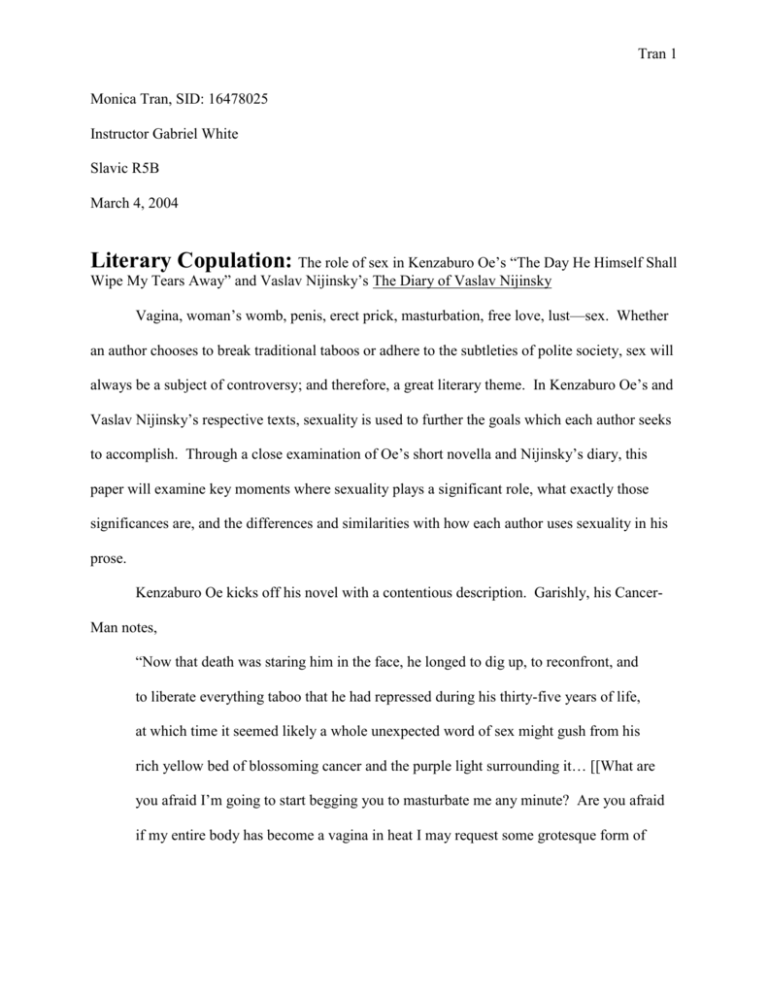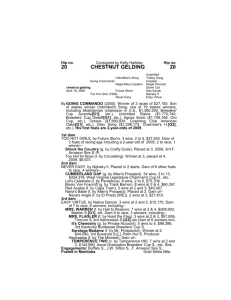
Tran 1
Monica Tran, SID: 16478025
Instructor Gabriel White
Slavic R5B
March 4, 2004
Literary Copulation: The role of sex in Kenzaburo Oe’s “The Day He Himself Shall
Wipe My Tears Away” and Vaslav Nijinsky’s The Diary of Vaslav Nijinsky
Vagina, woman’s womb, penis, erect prick, masturbation, free love, lust—sex. Whether
an author chooses to break traditional taboos or adhere to the subtleties of polite society, sex will
always be a subject of controversy; and therefore, a great literary theme. In Kenzaburo Oe’s and
Vaslav Nijinsky’s respective texts, sexuality is used to further the goals which each author seeks
to accomplish. Through a close examination of Oe’s short novella and Nijinsky’s diary, this
paper will examine key moments where sexuality plays a significant role, what exactly those
significances are, and the differences and similarities with how each author uses sexuality in his
prose.
Kenzaburo Oe kicks off his novel with a contentious description. Garishly, his CancerMan notes,
“Now that death was staring him in the face, he longed to dig up, to reconfront, and
to liberate everything taboo that he had repressed during his thirty-five years of life,
at which time it seemed likely a whole unexpected word of sex might gush from his
rich yellow bed of blossoming cancer and the purple light surrounding it… [[What are
you afraid I’m going to start begging you to masturbate me any minute? Are you afraid
if my entire body has become a vagina in heat I may request some grotesque form of
Tran 2
masturbation such as jamming a pole in the sea anemone of my body and stirring it
around? ‘he’ teased pathetically, half in ridicule but half solicitously.]]” (Oe, 10-11)
In this passage, Cancer-man not only uses vulgar language, but even goes as far as to revel in the
fact that the acting executor of the will finds his image of a “vagina in heat” disturbing.
“Solicitingly” taunting the acting executor of the will to masturbate him in a way which is
masochistic—with his choice of the word “jamming” giving the action a violent undertone—
Cancer-Man finds that he can use sexual language for malice. In this light, Cancer-Man’s
descriptions purposefully push the limits to what the acting executor of the will finds acceptable
while taking a sick pleasure out of breaking those limits. Coincidentally, the acting executor of
the will is a woman, to be exact, she is his wife.
Furthermore, this particular play on sex is highly evocative of Freud’s Oedipus complex
(Freud, 188-192). The reference that Cancer-Man makes to himself as a “vagina” rather than
penis shows that he is experiencing what Freud calls “castration fear”—that is, fear that the
father will cut off the son’s penis because both father and son are vying for the love of the
mother. Although Cancer-Man’s desire to possess his mother is more in the realm of the desire
for her acceptance more so than sexually, as a child, Cancer-Man is not able to clearly
differentiate between the two. After all, his mother “maintained that he had actually been mad
since he was three” (Oe, 38). Therefore, as a result of his insanity, Cancer-Man does not
progress out of the phallic stage (when the Oedipus complex first emerges) and instead develops
a strange fixation to equate sex with his mother.
The theme of cruelty comes up once again when Cancer-man is having sex with the
actress. After the actress asks, “Is there something lewd about ‘a cry of grief for the wind in my
sails,’” Cancer-man decides that sex has ceased to become pleasurable. He states,
Tran 3
“But at that instant a lightening bolt crashed across the vault of his slackened brain and,
judging that considerable toil remained before the time of her orgasm, he descended
towards his penis buried in his girlfirend’s genitals and all alone, a vague smile on his
lips, ejaculated. Thereafter there was always something oppressive about sexual
intercourse with the actress, as if a taboo were being violated, and after intercourse he
was not only exhausted but his testicles ached for no good reason, as if they were being
squeezed. Since the mere possibility that a man having intercourse with her could
experience anything but undiluted sweetness terrified the actress…A number of years
still later she appeared on his television screen in a late night movie playing a woman
landlord, and he felt he was seeing a phantom of his mother…” (Oe, 42)
Within this context, Cancer-Man has manipulated an act which is supposed to be mutually
enjoyable to an act that is for his own selfish gain. He not only gauges that he can withhold
sexual pleasure, but then does so with a “vague smile on his lips,” relishing in the malice of the
act. Once he realizes that he is in the control position, he finds that abusing his power to the
dismay of the actress is even more gratifying than the actual act of having sex. More importantly,
though, this passage introduces the aspect of Cancer-Man’s sexual relations that involves “seeing
the phantom of his mother,” possibly explaining his reasons for the sadism he takes out on the
actress and his wife.
Throughout the novel, Cancer-Man is fixated on seeking retribution from his mother,
who constantly challenges his worth as a son. Cancer-Man first lists off the injustices his mother
has weighed against him. He laments, “It was like being caught masturbating, and told Look
here! A monkey masturbates just the way you do…and only that crippled organ wounded in
countless battles for male supremacy…that was the form of humiliation you chose for me,
Tran 4
wasn’t it, Mother! You did everything in your power to make me feel just how low and
shameless…” (Oe, 34) With his father away in Manchuria, Cancer-Man only had his mother to
look to for parental support. She, on the other hand, not only favored his step-brother but also
personally despised Cancer-Man, who was born of her own womb. Deprived of the maternal
love that he felt was righteously his, Cancer-Man develops a bitter hate towards his mother, who
played favorites with a child that was not even her own.
Keeping these circumstances with his mother in mind, Cancer-Man’s repetition of, “a cry
of grief for the wind in my sails,” while having sex with the actress, holds a new significance. In
the context of the entire poem, Cancer-Man realizes that his mother felt grieved while pregnant
with him. (See Appendix)
He is the son of a man who “had seen to it that she [his mother] was
securely tethered in the depths of the forest for the rest of her life, [before setting] out for China
again and remained there, active at something in Manchuria for years” (Oe, 60). Abandoned by
her husband and burdened by her pregnancy, this young woman has truly become “tethered” to
her lonely future. Therefore, the fruit of this unhappy marriage (Cancer-Man) is a reminder of
the youth she has lost by marrying the abominable certain party. When the actress reiterates that
line from the poem, “a lightening bolt,” or flashback of painful revelations, pops into CancerMan’s mind. The fire of his resentment is rekindled and the flame of his cruelty stings the
unknowing actress, who had only wanted to enjoy the “lewdness” of the poem in the first place.
Although he constantly dreams of scenarios where he might spite his mother, CancerMan never actually succeeds in executing any of them. Therefore, this initial sexual encounter
with the actress who whispers “a cry of grief” forever leads him to equate sex with memories of
“the sting of his mother’s poem” (Oe, 41—which Cancer-Man had long since repressed and
would now be called a Freudian slip. This explains why, “there was always something
Tran 5
oppressive about sexual intercourse with the actress, as if a taboo were being violated.” Just as
his mother was oppressed by her pregnancy, Cancer-Man is likewise oppressed by the anger he
has held inside himself all these years.
It is through this mother association that Cancer-Man learns to use sex as a weapon, first
with the actress and later with his wife. With the actress, his satisfaction comes from the
realization that he has broken her sexual self-confidence—much like his mother had broken his
with her favoritism of his brother, whose “crippled organ [was] wounded in countless battles for
male supremacy” (Oe, 34). Unable to directly confront his mother with his feelings of
resentment, Cancer-Man instead seeks vengeance by displacing his frustration onto the females
with whom he has sexual encounters with.
Notice, though, that the thought of depraving the actress of sexual pleasure is much more
successful than the actual act. After ejaculating, “he was not only exhausted but his testicles
ached for no good reason, as if they were being squeezed.” Metaphorically speaking, the release
of his orgasm is equivalent to the release of the anger that Cancer-Man holds against his mother.
Even as he satiates his need to be cruel, his triumph is dampened because the joy of his victory is
clouded in physical pain. The cliché, “There is a thin line between love and hate,” holds much
applicability to Cancer-Man’s relationship with his mother. Hate can only be driven by an
emotion that is equally intense—namely, love. In Cancer-Man’s case, his hate roots from the
pain of never being worthy of his mother’s love; thereby resulting in the redirection of his
energies to spite her instead. However, because Cancer-Man really does love his mother at some
level, he will never be able to feel fully vindicated, as one can never bring themselves to truly
hurt a loved one. No amount of energy will allow Cancer-Man to purge himself of his mother’s
Tran 6
influence with efforts to do so, only resulting in the unsatisfactory aching of his “testicles…as if
they were being squeezed.”
The Diary of Vaslav Nijinsky is likewise wrought with the mother-sex link. Directly
preceding the homosexual encounter when Nijinsky “trembled like an aspen leaf,” he states,
“Sixty-five roubles a month was not enough to feed my mother and myself” (Nijinsky, 103).
Although he doesn’t spell out the connection, his relationship with Prince Pavel Lvov is
primarily motivated by a desire to further his career, which would allow him to improve his
mother’s living standard. Later, when his companion Isayev teaches him how to masturbate,
Nijinsky notices that, “my dancing was beginning to deteriorate. I was scared because I realized
that my mother would soon be ruined and I would not be able to help her.” (Nijinsky, 117)
Nijinsky, like Cancer-Man, also comes to the conclusion that he can inflict harm through his
sexual habits, which would “ruin” both his career and his mother. However, unlike Cancer-Man
who offends with his “vagina in heat,” Nijinsky chooses to “combat his lust” to preserve his
mother’s welfare, instead of using it cruelly to harm.
Furthermore, it is in this same section that the reader first learns of the reasons for
Nijinsky’s later distaste for sex as an adult. Once he stops masturbating for love of his mother,
he notices that, “I got top marks…I loved my mother infinitely. I decided to devote myself to
dancing even more. I grew thin. I started to dance like God. Everyone started talking about me”
(Nijinsky, 118). The result that his dancing improved upon the end of his masturbation habit is
only a correlation, not necessary causation. However, this fact is inconsequential to Nijinsky,
who, like most others, will neglect these statistical details. A true artist, Nijinsky will go to the
end of the world to pursue his passion for dance—an end of the world that includes an end to
those behaviors which threaten his art (lust is merely one of them).
Tran 7
Mentions of sexuality throughout the novel are almost always followed by mentions of
food. In addition to selling himself to Diaghilev’s minions to ensure that he had enough money
to “feed” his mother and growing “thin” after he stops masturbating, Nijinsky also notes that,
“Once I made love to a woman who had her period. She showed me everything, then I was
horrified and said that it was a shame to do this kind of thing when a person was ill. She said to
me that if she did not do this kind of thing, she would starve to death” (Nijinsky, 20) He
continues one page later, stating, “I do not like excitement and therefore do no like to eat meat.
Today I ate meat and therefore had a feeling of lust for a woman of the streets.” At the ascension
of his madness, Nijinsky’s aversion for sex evolves to include a number of other vices such as
meat. What began as a cause to pursue for his dancing is now a subset of Nijinsky’s higher
purposes in life, as charted out by a man named Leo Tolstoy.
As a man’s whose preaching was followed by the likes of Mahatma Gandhi, Tolstoy
offered a pacifist approach to the world while emphasizing the need for more humanity.
Tolstoyism champions the kind of life that emphasizes the self-control of the animal personality,
instinctively rooted in being human. A major tenet of Tolstoyism, then, is the repression of
sexual desire, a physical need inherent to the animal personality. Along with eating and
defecating, reproduction must be restrained for moral growth to occur (Mittal, 32-34).
Therefore, Nijinsky’s constant association of “lust” to “meat” is accounted for by his beliefs in
Tolstoy’s philosophies. People on the brinks of death often revive their religious fervors in order
to construct for themselves, meaningful existences in the world. This phenomenon is similarly
experienced by Nijinsky, who is at the edge of insanity. Under the Tolstoyian lens, chastity now
not only serves a practical utility of allowing Nijinsky to better his art, but it also becomes
Tran 8
embedded in a deep moral instinct. For Nijinsky, the teachings of Tolstoy give him a noble
cause to believe in and to be comforted by before his mind deteriorates.
Although, he does not use sexual language to harm or offend as Oe does, Nijinsky does
use it to condemn. On Tessa, Nijinsky states, “She loves a prick. She needs a prick. I know
pricks who do not love her. I know that everyone will be ashamed of this word, and that is why I
wrote it, because I want everyone to know what life is…Life is not a prick. A prick is not life.
A prick is not God. God is a prick who breeds children with one woman” (Nijinsky, 50).
Translated from the Russian word khui, the word “prick” has the English connotative equivalent
of “dick.” Nijinsky admits that his usage of the word “khui” will be controversial, but does so in
order to emphasize the shamefulness of Tessa’s sins. Nijinsky’s renunciation of Tessa begins
tamely with, “Tessa thinks that no one understands her tricks,” but escalates to the point where
Nijinsky becomes obsessed with his repetition of the word “prick.” This fanaticism of
Nijinsky’s language is a flashback to the radical evangelists who would draw upon mob
mentality to denounce the various evils of the world. Nijinsky is God. God is Nijinsky.
Therefore, Nijinsky will use obscene language to impart judgment onto the heads of those
deviating from the Tolstoyian doctrine of abstinence.
Looking at sexuality throughout the text, Nijinsky seems to be most concerned when the
women in his family are involved. He is seldom reproachful of the numerous “tarts” with whom
he has relations with, although they are engaged in the profession of selling sex for a living (See
pages 20, 53, 198, etc.). Tolstoy preached the uplifting of the peasant classes, which in urban
areas would have included prostitutes. Therefore, although they are constantly in the wrong with
God, tarts are spared from the harsh sentences that Nijinsky delivers to those in his family.
Nijinsky finds Romola somewhat detestable because she “likes experiencing a feeling of lust for
Tran 9
me” (Nijinsky, 156). Like Tolstoy, who also despised his wife (Wilson, 352), Nijinsky echoes
the themes of misogyny stating that, “I want to screw her in order to have a child and not because
of lust.” Nijinsky speaks about his wife with much condescension and views her as a woman
with a weak moral discipline. She is a tool to be “screw[ed]” for his own religious purposes,
regardless of whatever needs she may need fulfilled. Because she does not control her animal
instincts, Romola is considered immoral by Tolstoy’s standard and therefore is inferior next to
Nijinsky. Nijinsky’s portrayal of Romola is unfavorable and disparaging at best, not intended to
be hurtful slander (although the effect it had on Romola might have been).
However, it is ultimately Kyra whom Nijinsky is most cruel to. Upon the discovery that
Kyra had been masturbating, Nijinsky writes,
“I told her today that she was masturbating. She felt that when I looked at her…Her
mother thought that I was accusing the child wrongly and therefore said something to me
in Kyra’s defense. I answered her roughly and showed Kyra once again that I understood
her. I began picked at
my finger and then made a movement that Kyra makes when
she is masturbating” (Nijinsky, 101).
As a child, Kyra is only exploring the curiosities of her body—she does not realize that such acts
are religiously damnable. Nijinsky does not appear to be a cruel man, yet he terrorizes his
daughter, chastising her with grotesque movements of his fingers. Even at her age, Kyra is old
enough to understand shame—especially after Nijinsky brings her humiliation center stage. In a
biography on Nijinsky, Romola notes that prior to his madness the dancer was so introverted that
many of his colleagues called him “Dumb-bell”1 (R. Nijinsky, 334). Therefore, the overt nature
of the confrontation with Kyra would be out of character for a man who was otherwise so mild-
1
Romola had a personal interest at stake in her portrayal of Nijinsky. Thereby, it should be taken into
consideration that some of the things she says about her husband are unreliable.
Tran 10
mannered. Furthermore, although Nijinsky found that he could use the word “prick” without
pretense, he dealt with female genitalia by using much more euphemistic words like “womb”
(Nijinsky, 21). Demonstrating a discomfort when speaking of the female gender, Nijinsky would
have been even less likely to face Kyra head-on while he was sane—even if he had felt similarly
about her masturbating. Although the episode was probably quite traumatic, Nijinsky did not
engage in a deliberated act of malice to hurt his daughter. Rather, the effect of the admonition is
to condemn, although insanity forces it to come off in a way that is cruel.
That is not to say that The Day He Himself Shall Wipe My Tears Away is devoid of
personal judgments, either. Kenzaburo Oe was highly influenced by the writings of the French
philosopher François Rabelais. Adhering to the teachings of his own humanist, Oe believed that
bodily functions, instead of needing to be repressed, needed to be brought to the forefront of
people’s attention. For Rabelais, it is exactly Tolstoy’s animal instincts which root and unite
people as human beings. He felt that people were apt to forget these central commonalities of
the human race and as a result, were more able to come into conflict on terms of race, gender,
social status, etc. (Sanroku, 1985). Therefore, Oe enhances sexual scenes with lurid descriptions
of the “sea anemone” and “ejaculat[ing] all alone” in order to remind the reader of his or her
most base and primitive existence as a human being aside from race, gender, or social status.
This attempt at injecting the text with social commentary is subtle next Nijinsky’s explicit
renunciations, but such methods are inherent to works of fiction, which are expected to be more
sublime in the exposition of meaning and themes.
Although the Oe’s fictional Cancer-Man does not use lust as grounds for judgment as
Nijinsky does, the artist himself does use language as a vehicle to condemn un-Rabelaisian
portrayals of sex, just as Nijinsky condemns those things which are un-Tolstoyian. Nijinsky may
Tran 11
not come anywhere close to rivaling Oe’s flowery style and vivid imagery, but his discussions of
sex are disturbing within the contexts they occur in. Nijinsky’s actions speak louder than his
words. Throughout his diary, sex is used against women in such a way as to assail and sentence
because as the reader must keep in mind, “Nijinsky is God” and in the tradition of Leo Tolstoy,
sex is a damnable act which warrants criticism. Oe, on the other hand, uses sex sadistically,
taking pleasure out of being cruel to his wife and the actress, in a vicarious effort to spite his
mother. Ultimately, although both texts use sexuality to illuminate other themes and influences
central to the literary works, Nijinsky’s cruelty is not deliberated or used for his amusement like
it is for Oe’s Cancer-Man.
Tran 12
Appendix
Should some unlikely suitor make his way to me,
Tel him, pray,
That I am gone to the full-bellied sea,
With a cry of grief for the wind in my sails.
(Oe, 40)
Analysis: Cancer-Man’s mother did not marry her husband by choice. As a young woman, she
was probably still holding onto the hope that other suitors would come and take her away from
this marriage “to the land” rather than to a tangible husband. However, now that she was
pregnant, she could no longer hope for such salvation as no one would want a pregnant woman.
As a fruit of her unhappy marriage, Cancer-Man is spurned for not only being the child of a man
who abandoned her, but also for shutting the door on her freedom (“wind in my sails.”) to escape
her “tethered” life.
Tran 13
Works Cited
Freud. Sigmund. Collected papers by Sigmund Freud, Version 23. New York: The International
Psycho-analytical Press, 1924-1950.
Mittal, Sarla. Tolstoy: social and political ideas. Diss. Allahabad University, 1966.
Meerut, Meenakshi Prakashan, 1966.
Nijinsky, Romola. Nijinsky. 1934. Reprint, New York: Pocket Books, 1972.
Sanroku Yoshida, Kenzaburo Oe: A New World of Imagination, in Comparative Literature
Studies, Vol. 22, No. 1, Spring, 1985, pp. 80-95. <http://galenet.galegroup.com/servlet
/LitRC?locID=ucberkeley&frmhyp=1&srchtp=athr&c=3&PN=CLC0153DOC01525&stab=
128&ai=66869&svdste=9&docNum=H1101530000&bConts=16047&ST=kenzaburo&vrsn
=3&OP=contains&ca=1&ste=120&tab=4&tbst=arp&n=10>
Wilson, A.N. Tolstoy: A biography. New York: W.W. Norton & Company, March 2001.








